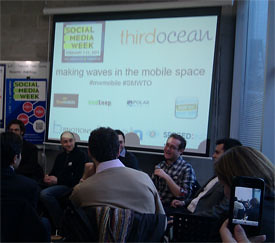Toronto startups gather to discuss the future of mobile technology
 Day one of Social Media Week in Toronto featured an afternoon event focused exclusively on the trends and local startups that are impacting the mobile space today. The panel discussion entitled “Making Waves in the Mobile Space,” was hosted by BNOTIONS and thirdocean. The panellists debated over where the mobile tablet market is headed and who would be the dominant mobile platform players in the next few years.
Day one of Social Media Week in Toronto featured an afternoon event focused exclusively on the trends and local startups that are impacting the mobile space today. The panel discussion entitled “Making Waves in the Mobile Space,” was hosted by BNOTIONS and thirdocean. The panellists debated over where the mobile tablet market is headed and who would be the dominant mobile platform players in the next few years.
Many of the major mobile technology heavy-hitters from Toronto were represented on the panel including speakers from BNOTIONS, Burstn, Endloop Studios, Five Mobile, Polar Mobile, Spreed Inc., and Task Ave. Below are some of the key themes that stood out throughout the discussion:
It’s too early to tell who will dominate the mobile tablet space. Most of the panellists agreed that the influx of new mobile tablets on the market will pose a challenge for developers to create applications that work well across all of the different platforms.
There were opposing views as to who would dominate this space in the years to come. Mark Pavlidis, iOS Developer at Task Ave., stated that it is currently a “two-horse race between the Android Tablet and the iPad.” Yet, many of the other speakers argued that it is still too early to tell who will dominate this space – especially with new players entering the market like the BlackBerry PlayBook.
To simply have a “mobile strategy” is not a good business objective. David Coleman, Director of Sales and Marketing at Spreed Inc., said that the first step is to “define your business goals.” He explained that customers need to identify why they need a mobile application or strategy (i.e. for discovery of the brand or for convenience). Once the goals have been defined, it will be easier for businesses to develop a use case for building their mobile solution.
Different mobile platforms solve different customer problems. Rob Kenedi, Partner at Endloop Studios, explained how mobile users have different expectations and levels of patience than web users. Brands have little to no time to catch a mobile user’s attention. Kenedi said that “mobile app users expect instant gratification and want their info within ½ a second.” Web users, on the other hand, typically lose interest after 8-10 seconds. Kenedi explained that “mobile tablets are a blurry space between the two platforms because they have both an app ecosystem and a web browser.”
Satish Kanwar, Co-founder of Task Ave., argued that different platforms make sense for different customers. He said that the key is to “first define the customer experience that you want to create and then determine the correct platform on which to build your application.”
When asked whether we will all become too dependent on the Apple platform and products, Amit Shah, Managing Partner at Five Mobile, explained that Apple dependence is “more of a North American phenomenon.” He said that the “premium price point for Apple products is much higher than what other countries around the world can afford or adopt at this time.” Therefore, the Apple platform most definitely solves problems for a specific customer base.
It’s still unclear whether HTML5 will be the game changer that mobile developers are seeking. All of the panel speakers voiced frustrations around developing applications across multiple platforms. They explained that proposed solutions like the emergence of HTML5 is possibly 3-4 years away. Even then, there was debate as to whether HTML5 would really solve all of their challenges. Most of the speakers are still in favour of native versus web-based applications. Dave Senior, Co-founder of Burstn, said that there “are currently no clear shortcuts when it comes to developing apps across multiple mobile platforms.” If you are trying to take shortcuts, “it is the end user who suffers.”
Michael Russo, Chief Technology Officer at Polar Mobile, cautioned that “with newer, cheaper smartphone models coming out in the next year or so, the developer’s job is going to get even harder.” He explained that the user experience on the new models coming out of China will be lower quality. Therefore, it will be even trickier to make applications look the same across all of the different platforms.
Alkarim Nasser, Founder of BNOTIONS, said that “comparing the experience between HTML5 and native apps is an apples to oranges comparison.” Many of the panellists suggested that the future will most likely involve a hybrid solution between native apps and HTML5.




